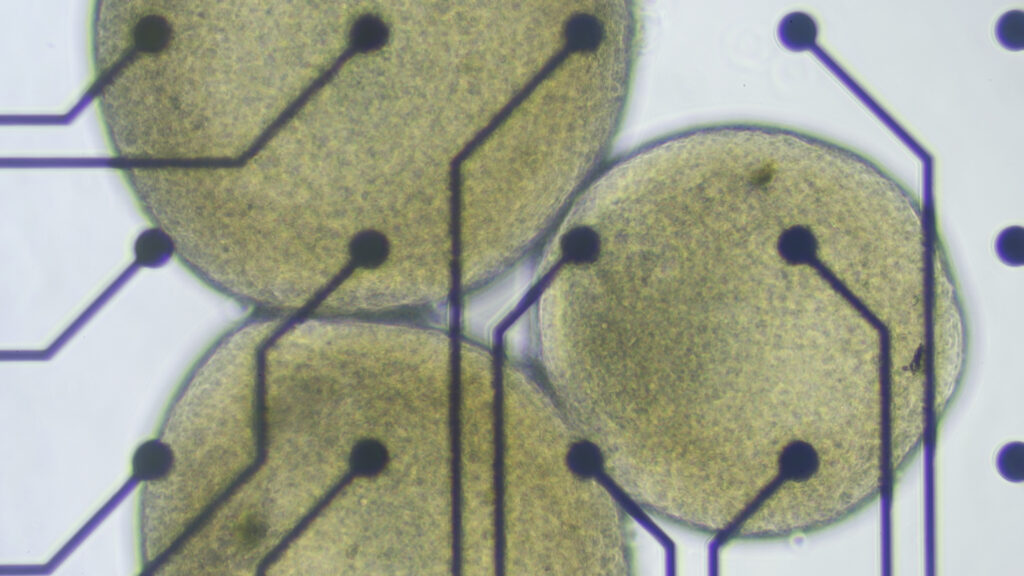Science
Scientists Urge Caution as Organoid Intelligence Gains Attention

Research into brain organoids is advancing rapidly, raising essential questions about the ethical implications of their application. At a recent gathering in Pacific Grove, California, experts discussed the potential of these lab-grown brain models, highlighting concerns over exaggerated claims surrounding “organoid intelligence.” This term, introduced by researchers Lena Smirnova and Thomas Hartung in 2023, suggests that these organoids could exhibit capabilities akin to learning and memory.
In their lab at Johns Hopkins University, Smirnova and her team have developed brain organoids that can communicate by sending and receiving electrical signals via microelectrodes. This technology aims to provide insights into how human neurons interact and could revolutionize our understanding of cognitive functions, particularly in relation to drugs, toxins, and genetic mutations.
Despite the promise shown by organoid technology, skepticism remains high. The National Science Foundation and DARPA have invested millions into organoid-based biocomputing, but many scientists worry that claims of organoid intelligence could lead to public misunderstanding and regulatory backlash. At the recent Asilomar conference, a diverse group of researchers, ethicists, and legal experts convened to explore the far-reaching implications of this emerging field.
Concerns Over Ethical Implications
During the discussions, participants raised significant ethical questions regarding the potential for organoids to develop sentience or consciousness. While intelligence may be a lower order of capability, the ambiguity surrounding the term “organoid intelligence” could have detrimental effects on the perception of this research. Sergiu Pasca, a neural organoid researcher at Stanford University, emphasized the importance of using precise language to avoid misleading the public and policymakers about the actual capabilities of these systems.
Another prominent voice at Asilomar was Tony Zador, a computational neuroscientist. He expressed doubts about the feasibility of creating organoids that operate on par with silicon-based artificial intelligence. Zador highlighted the complexities of understanding neuronal functions and the challenges of programming organoids to perform specific tasks.
The discussions reflected a larger anxiety within the scientific community that sensationalized claims could prompt restrictive regulations detrimental to legitimate research aimed at understanding and treating neurological disorders. Madeline Lancaster, who pioneered the development of brain organoids at the University of Cambridge, warned that overly broad regulations might hinder advancements in the field.
Aiming for Responsible Innovation
Smirnova, whose work focuses on the effects of environmental toxins on brain development, argues that organoids should not be seen as potential conscious entities. She clarified that their objective is to use organoids as tools to investigate neural functions rather than to create minds in a dish. Collaborating with bioethicists, her team aims to responsibly explore organoid capabilities while ensuring ethical considerations are prioritized.
The National Science Foundation has recognized the importance of ethical oversight in this research. Its “Biocomputing through EnGINeering Organoid Intelligence” program, launched in March 2024, mandates the inclusion of an ethicist as a co-principal investigator in all proposals, ensuring that ethical considerations are integrated at every step.
Companies like Cortical Labs, a biocomputing startup based in Melbourne, Australia, are also addressing ethical issues. CEO Brett Kagan has emphasized the need for transparency in their research, noting that they consulted ethicists prior to publishing findings related to organoid capabilities, such as teaching lab-grown neurons to play the video game Pong.
Nevertheless, the publication of these findings has sparked controversy. Critics argue that labeling neurons as “sentient” based on their ability to play a game could misrepresent the research and jeopardize the credibility of the field, potentially leading to restrictive regulations on organoid research.
As organoid intelligence continues to develop, the scientific community faces the challenge of establishing a shared language and understanding of these constructs. Kagan has initiated efforts to unite researchers across disciplines to create a consensus on terminology and ethical boundaries. He believes that collaboration is essential in addressing valid criticisms while fostering responsible innovation in the field.
The future of organoid research remains promising, but it hinges on the ability of scientists to communicate effectively about the capabilities and limitations of their work. As discussions around organoid intelligence evolve, maintaining a balance between innovation and ethical responsibility will be crucial for advancing this groundbreaking area of research.
-

 Technology5 months ago
Technology5 months agoDiscover the Top 10 Calorie Counting Apps of 2025
-

 Health3 months ago
Health3 months agoBella Hadid Shares Health Update After Treatment for Lyme Disease
-

 Technology6 days ago
Technology6 days agoOpenAI to Implement Age Verification for ChatGPT by December 2025
-

 Health3 months ago
Health3 months agoErin Bates Shares Recovery Update Following Sepsis Complications
-

 Technology4 months ago
Technology4 months agoDiscover How to Reverse Image Search Using ChatGPT Effortlessly
-

 Technology1 month ago
Technology1 month agoDiscover 2025’s Top GPUs for Exceptional 4K Gaming Performance
-

 Technology3 months ago
Technology3 months agoElectric Moto Influencer Surronster Arrested in Tijuana
-

 Technology5 months ago
Technology5 months agoMeta Initiates $60B AI Data Center Expansion, Starting in Ohio
-

 Technology5 months ago
Technology5 months agoRecovering a Suspended TikTok Account: A Step-by-Step Guide
-

 Health5 months ago
Health5 months agoTested: Rab Firewall Mountain Jacket Survives Harsh Conditions
-

 Health3 months ago
Health3 months agoAnalysts Project Stronger Growth for Apple’s iPhone 17 Lineup
-

 Lifestyle5 months ago
Lifestyle5 months agoBelton Family Reunites After Daughter Survives Hill Country Floods





















